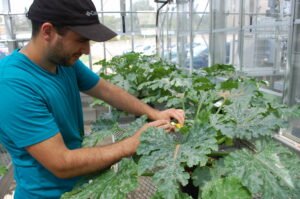What was the name of your institution and academic department?
Cornell University – Plant Breeding and Genetics; Plant Pathology and Plant-Microbe Biology.
What type of degree program were you enrolled in?
Graduate Student – PhD candidate
Who was your major professor and who are members of your committee?
My major professors were Drs. Michael Gore (Plant Breeding and Genetics) and Christine Smart (Plant Pathology). My committee members were Michael Mazourek (Plant Breeding and Genetics) and Philipp Messer (Population Genetics).
What is your hometown?
Silver Spring, Maryland
What is the focus of your work?
Plant breeding, plant pathology, and genomics
Introduce yourself—your background, where you are now, and your current research focus.
I grew up in Silver Spring, MD, in the Washington, D.C. suburbs. I graduated from the University of Wisconsin in 2013 with a B.S. in Agronomy and started my graduate education at Cornell in 2015 after spending some time working with the Floral and Nursery Plants Research Unit in the USDA ARS, Beltsville / National Arboretum as a technician, and also teaching English overseas. At Cornell, I was co-advised by Dr. Michael Gore in the Plant Breeding and Genetics section and Dr. Christine Smart in the Plant Pathology and Plant-Microbe Biology Section and I defended my dissertation in November, 2020. Since then, I have been working as a plant breeder for a vertical farming company, Bowery Farming, where I am based in Kearny, NJ.
Why did you choose to work with Cucurbits, plant breeding, plant pathology, genomics, horticulture, agricultural economics or crop production?
I grew up loving to garden and grow vegetables, especially tomatoes, and I was always fascinated by the diversity of the varieties available. An experience as an undergrad working in the carrot, beet, and onion breeding program of Dr. Irwin Goldman at the University of Wisconsin began my fascination with plant breeding and my decision to pursue a PhD.
What do you hope to accomplish during your time working on the CucCAP grant, and what do you most look forward to in this position?
I hope that my research leads to better tools for farmers to combat Phytophthora blight, which can cause really devastating economic losses for growers. My involvement in CucCAP also provided me with exposure to other researchers and opportunities to collaborate across institutions, which I really enjoyed.
Please provide a brief description of your research.
My research focused on two areas. One area was Phytophthora blight resistance in squash. As part of this area, I worked on developing and trialing new partially resistant breeding lines and also mapping genes involved in disease resistance. My other focus was pathogen population genetics. As part of this project, we sequenced and characterized isolates of the causal agent, Phytophthora capsici, from around New York and mapped genes in the pathogen associated with mating type, fungicide resistance, and virulence.
What is your favorite plant pathogen?
I think I will always be fascinated by Phytophthora blight and I will keep reading the literature to learn about the progress future students and researchers make in breeding for resistance in cucurbits to this disease.
What is your current position?
I’m currently working for Bowery Farming as a Plant Breeder.

